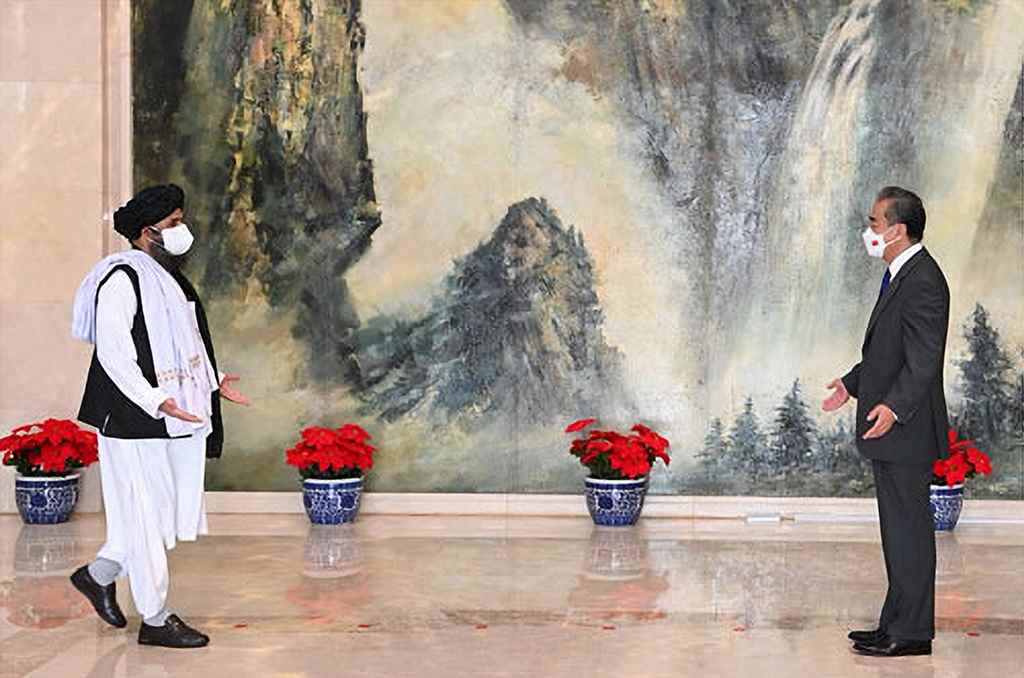17 August 2021
Major offensives by the Taliban over the past two weeks have netted them the overwhelming majority of Afghanistan. The flight of the Afghan President and the fall of Kabul sealed the fate of the old regime and confirmed the Taliban as the de-facto rulers of the state.
The result is that Afghanistan is undergoing a major shift from an American-leaning state, with a moderate (albeit corrupt) government, to an American–hostile state with a horrifyingly extremist regime. This is causing considerable consternation to Western governments for political, economic, military, and humanitarian reasons.
Yet, they are scarcely the only major actors to be affected. For the Chinese government, the return of the Taliban to power brings both dangers and opportunities, which helps to explain why their diplomats have been so proactive in meeting with the Taliban over recent months. Their goals in these outreach efforts include maintaining and growing China’s economic outreach into the region; limiting Taliban support for Uyghur militants in Chinese ruled Xinjiang; replacing haemorrhaging American sway in Afghanistan with Chinese influence, and avoiding a resurgence of civil war that could further destabilize the entire region and disrupt China’s ability to secure natural resources from it. Each of these is discussed more fully below.

One of China’s biggest priorities over the past decade is the expansion of its One Belt, One Road initiative, which seeks to extend Chinese economic and political influence to its west through land and maritime investment. Afghanistan sits firmly in the middle of the land-based “Belt” portion of the initiative, making it an ideal candidate for Chinese attention. To date, Chinese efforts in this area have been somewhat successful, with a growing amount of aid and infrastructural development flowing into Afghanistan, but they have also been limited by the pro-American disposition of the Afghan government. While the Taliban were seizing control of Afghanistan, however, the Chinese government shifted to cultivating them instead in order to push for further expansions of the Belt within Afghanistan. The Taliban have appeared receptive to this idea to date and Chinese efforts in this area seem likely to continue.
Another area of relevance for China with relation to Afghanistan stems from within its own borders. For decades, the Chinese government has wrestled with the problem of Uyghur militants fighting against Chinese rule in the Xinjiang Autonomous Republic. Concerns about Uyghurs travelling to Afghanistan in order to gain combat experience, training, arms, financing and other support from the Taliban has led the Chinese government to already seek and secure agreements with the Taliban regarding limiting their support for the Uyghurs. Ensuring that the Taliban do not renege on this commitment now that they are fully ensconced in power will surely remain a priority for Chinese diplomacy going forwards.
At a broader level, China has the objective of challenging American global leadership and the pro-democratic values that it promotes across the world. American involvement in Afghanistan after 2001 has unintentionally served as a litmus for America’s ability to successfully extend its military and political muscle into any region of the world. The rapid collapse of the American-backed Afghan government in recent months is speaking volumes across the globe about the limitations of American power. The Chinese government believe that this represents an opportunity to demonstrate not only their own international reach, by working to replace American influence within Afghanistan, but also the superiority of their self-professed non-interventionist model of expansion.
Finally, despite its position as a rising power that is challenging the status quo of American hegemony, China is nevertheless – at least ostensibly (and with notable exceptions towards Taiwan, the South China Sea, the East China Sea and a smattering of other locales) – committed to a peaceful world, in which it’s growing economic and diplomatic clout allow it to grow domestically and to rise in global status. The Chinese government’s goals here are best served by the Middle East and Central Asian regions remaining relatively stable, in order that they can obtain cheap oil and other natural resources from them. The prospect of the civil war in Afghanistan being rekindled and allowed to further destabilize the countries around it, which could severely restrict Chinese access to vital resources, is unpalatable for Beijing. The Chinese government is therefore keen to ensure a quick return to a relatively calm Afghanistan, rather than supporting some kind of meaningful opposition within the country, even though this means accepting the brutal Taliban at its helm.
The strategic logic behind China’s engagement with the Taliban is therefore quite clear from a rational choice point of view. Yet, it has led to a situation where China is recognizing and engaging actively with a truly terrible group that has a long track record of committing reprehensible human rights atrocities. This, in turn, is undermining the ability of the global community to present even a diplomatic united front against the Taliban. The Chinese government’s strategy may yield a victory of sorts for their own objectives, but this is a bitter triumph that ignores the plight of the Afghan people and contributes to their abandonment to an awful fate by the international community.
Feature Photo – Chinese Foreign Minister meets with Taliban delegation, 2021, – Ministry of Foreign Affairs of the People’s Republic of China


